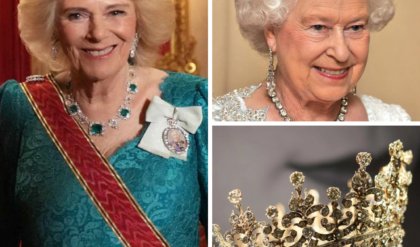
Photo: Courtesy of HBO.
On its surface, the Dune universe is run by men. The Dune movies are about the chosen one, Paul Atreides, and his ascension to power among men. And, yes, the Imperium is ruled by an emperor who oversees the Great Houses (also led by men). But with Max’s new TV series Dune: Prophecy, it’s clear that the Bene Gesserit, a powerful ancient sect of women with near-superhuman abilities, are the ones really running things — and they have been quietly dictating the course of history for thousands of years.
Set 10,000 years before Timothée Chalamet’s Paul Atreides and Zendaya’s Chani are traveling via giant sandworms in the desert, Dune: Prophecy shows the Sisterhood (later known as the Bene Gesserit) in its messy journey to power and as it establishes an organization that puppeteers from the shadows by counseling the leaders of the Great Houses and manipulating bloodlines in order to cultivate rulers they can control. Loosely set after the events in Sisterhood of Dune, a prequel novel by Brian Herbert (the son of the original Dune author Frank Herbert) and Kevin J. Anderson, Dune: Prophecy’s story is almost wholly new, giving the show room to expand on arguably the most compelling group of women in sci-fi and subvert gender power dynamics even more. “I think the Sisterhood — the Bene Gesserit — play probably the most essential part of the whole [Dune] universe,” executive producer Jordan Goldberg tells Refinery29. “Yes, it’s all about Paul Atreides later on, but really, Paul Atreides is perhaps part of their doing.”
At the heart of Dune: Prophecy are Mother Superior Valya Harkonnen (Emily Watson) and Reverend Mother Tula Harkonnen (Olivia Williams), two sisters working to cement the Sisterhood’s future in the face of existential threats, particularly in the form of a foreboding prophecy and a powerful, mysterious soldier named Desmond Hart (Travis Fimmel). Fans will no doubt recognize the sisters’ last name, but these women are a far cry from the bald psychopaths that are Austin Butler’s Feyd-Rautha and Stellan Skarsgård’s Baron Harkonnen in Denis Villeneuve’s films. Instead, we meet House Harkonnen in a fragile moment rooted in family tragedy and disgrace. But don’t be fooled: These sisters still have that notorious Harkonnen intensity and rage.
For the Harkonnen sisters, Watson and Williams took inspiration from some of the most infamously ruthless ruling women in history. “We went to look at portraits of Queen Elizabeth, Mary Queen of Scots, Bloody Mary, all those Tudor women, because that’s a universe that has a similar sense of these very powerful, enigmatic women [who were] like puppet masters controlling everything,” Watson tells Refinery29.
As matriarchs, Valya and Tula run a school of young female acolytes who are taught the power of “truthsense,” the precise ability to tell when someone is lying. On the secluded planet of Wallach IX, the Sisterhood is under no one’s supervision but their own. The school, along with pretty much everything else about them, allows the Sisterhood to deeply lean into the idea of feminine mystique as a way to cement intrigue and importance in the Imperium. “I still think men are fascinated by what women get up to when men aren’t there,” Williams says. “They’re playing on that mystery of what the men that are still ruling the universe largely are very scared of: the wisdom of women — and the fact that women weirdly seem to be able to tell when they’re lying!”
Setting up a school for girls who can discern truth from lies seems pretty innocuous, if not beneficial for the greater good of the Imperium. Rather than make it a skill to fear, the Sisters have finessed it into a coveted asset to the Great Houses. By hiring out Truthsayers to leaders, they infiltrate the halls of power in a very public role where they advise people.

Photo: Courtesy of HBO.
As part of their mystique, the Truthsayers take on a quasi-religious image by mostly staying silent and wearing armor-like black veils, space nun headpieces, and chaste formless dresses, in order to play into the archetypes that men in power expect from weird, witchy women. They’re imposing enough to be taken seriously, but devoutly feminine enough to be seen as harmless. “[It’s] excellent branding on their part in terms of the veil and just the remove at which they hold themselves,” showrunner and executive producer Alison Schapker says. “They’re kind of walking embodiments of mystery.”
By leaning into these aesthetics, the Sisters not only coax leaders into letting them dutifully advise their every move, but also hide in plain sight as they pull the strings of the universe. “They present themselves as a mystical order, but deep down they’re using espionage, they’re using sabotage, they’re using political influence, they’re using a variety of skills that control power,” Goldberg continues. “And one part of it, which I think is really essential, is controlling a narrative. If you control the narrative, I think you can control the future.”
Most importantly, the Sisterhood has convinced the ruling class that they are not a threat to its position, thereby allowing them to have the ultimate power in the Imperium. “The Sisterhood allows the men to think that they’re in charge, because that’s convenient,” says Watson.
“
It’s rare to see a show on such a big scale that goes through these relationships that women have to each other that don’t really have anything to do with men.
Chloe Lea
”
Powerful women are nothing new to blockbuster sci-fi or fantasy. But often it’s reserved to a handful of female characters who try to exercise influence within otherwise patriarchal societies, such as Alicent and Rhaenyra in House of the Dragon, Rey in the new Star Wars movies, or Furiosa in the Mad Max franchise. Dune: Prophecy flips that narrative on its head with a bold display of feminine centralization that depicts women with the nuances of power that are typically awarded to men in sci-fi (and beyond).
“It’s the fact that this is a sci-fi, huge world, but we’re honing in on the women, and the women are powerful and they literally run things,” Jade Anouka, who portrays talented acolyte Sister Theodosia, says. “Not only is it women at the top of their game, but it’s women helping younger women to step up.” In the series, certain promising disciples like Sister Theodoia and Sister Lila (Chloe Lea) are called upon to take on bigger responsibilities as the Sisterhood seeks to fend off threats and cement its position. And even within the Sisterhood, there are diverse relationships, opposing views, and power struggles among not just those in charge, but also the students, some of whom directly question the motivations of their organization and matriarchs. “It’s rare to see a show on such a big scale that goes through these relationships that women have to each other that don’t really have anything to do with men, specifically, which I think is really cool,” Chloe Lea says.

Photo: Courtesy of HBO.
Sarah-Sofie Boussnina as Princess Ynez Corinno.
Beyond the Sisterhood, every leading woman of Dune: Prophecy is also a major power player. Princess Ynez Corrino (Sarah-Sofie Boussnina), the daughter of Emperor Javicco Corrino (Mark Strong) who is set to join the Sisterhood to become a stronger heir, cares deeply for those she’s close to, including her party boy brother, Constantine Corrino (Josh Heuston), and strapping royal swordmaster, Keiran Atreides (Chris Mason), but at the same time is strongly governed by personal desires. She’s aware that she is both a pawn in political alliances and a player who can gain from any given situation. “She’s trying to get what she wants out of things, as well,” Sarah-Sofie Boussnina tells Refinery29. “She’s playing her cards.”
And then there’s Empress Natalya Corrino (Jodhi May), who is somewhat sidelined from her husband’s ear in the presence of a royal Truthsayer and has to find agency on her own terms. “She’s someone who trusts her instinct, and she’s incredibly wary of this overreliance on the Sisterhood,” Jodhi May says. “It’s a really interesting investigation of how women behave in positions of power with each other.” Given her position, Natalya has to be incredibly careful about how she navigates within the world of the Imperium. “It’s really a case of subtle manipulation, I would say — more honey than vinegar,” May adds. “Empress Natalia is really struggling with being a very smart woman and a real instinctive leader in a somewhat subordinated position. She’s struggling with how to exercise that power in a way that doesn’t set the cat amongst the pigeons yet, but as you keep watching, you’ll discover how that changes.”
Dune: Prophecy doesn’t pull any punches for the sake of aspirational “girl power.” No one is a straightforward hero or villain. Almost everyone has an unconventional edge of moral ambiguity and self-serving motivations, and it’s refreshing to see women (and lots of them) treated with complex depth and given unique displays of power that are essential to the plot. From the movies, we know that the Sisterhood eventually succeed in their millenia-long plans. How they get to that total domination of the universe, however, has yet to be explored. And where the movies and books may have whispered the commanding power of its women, Dune: Prophecy shouts it.
Dune: Prophecy premieres November 17 on Max.





